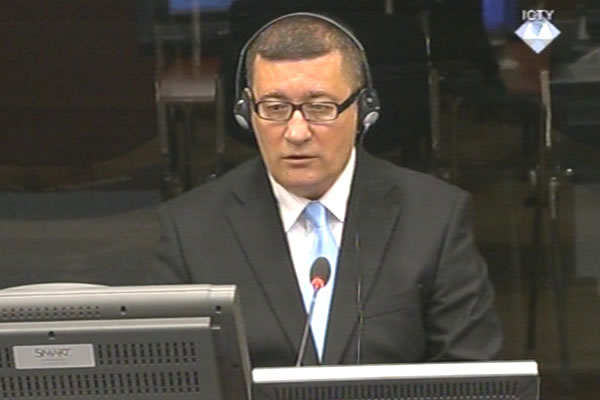Home
POLICE GENERAL HAD NO AUTHORITY VIS-À-VIS CRIMES
In a bid to explain how he was able to remain ignorant of the Srebrenica massacre despite his high function as the chief of the Public Security Department, police general Milenko Karisik claimed that in the Srebrenica operation the MUP was a ‘minor element’. He shifted all the blame on the army. Karadzic’s former advisor Jovan Zametica has refused to give evidence in Karadzic’s defense, and he now faces the possibility of a subpoena
 Milenko Karisik, defence witness of Radovan Karadzic
Milenko Karisik, defence witness of Radovan Karadzic Defense witness Milenko Karisik completed the evidence in the first part of the hearing at the trial of Radovan Karadzic. Karisik is a former chief of the Bosnian Serb MUP Public Security Department. In that capacity, Karisik visited the Zvornik area on 16 July 1995. He claims he didn’t know anything about the executions of the Srebrenica Muslims. The executions were carried out in that area before and during Karisik’s visit.
As the cross-examination continued, Karisik recounted how on that day he had met the Zvornik Brigade commander Vinko Pandurevic and the Zvornik police chief Dragomir Vasic at the brigade’s forward command position. The prosecutor noted that both Pandurevic and Vasic knew about the executions of the captured denizens of Srebrenica at executions sites around Zvornik. This fact was confirmed in Pandurevic’s conviction before the Tribunal, which sentenced him to 13 years. Vasic has admitted he knew about the executions. The prosecutor asked Karisik if Pandurevic and Vasic told him that they had been ‘working hard for three days’ executing the prisoners and burying bodies. Karisik replied that they didn’t discuss it. According to him, he asked them how he could achieve the release of a Serb police officer who had been captured by the Muslims fleeing towards Tuzla. As Karisik insisted, he did not have the authority to do anything else.
Since the witness claimed that the Srebrenica operation was under sole jurisdiction of the army, the prosecutor reminded him that the police special unit had killed more than 1,000 prisoners in Kravica, while the regular police provided security to the convoy with the detainees en route from Bratunac to Zvornik. The detainees were later executed, the prosecutor said. Karisik replied that in the Srebrenica operation, the MUP was a ‘minor element’ and that the army was in charge of everything. The prosecutor brought up an example of good cooperation between the army and the police when eight members of the VRS 10th Sabotage Detachment, involved in the execution in Branjevo, were issued with false identity documents. Karisik’s department produced the fake IDs on the orders of the interior minister. Petar Salapura, the intelligence chief in the army’s Main Staff, had requested it. As the witness said, he merely forwarded the minister’s order, which was quite legitimate.
In the course of his evidence, Karisik was adamant that the investigation of the Srebrenica crimes had been in the jurisdiction of the military judicial system. The prosecutor noted that the ‘one and only’ investigation had in fact been carried out by the Interior Ministry. The Ministry did not investigate the perpetrators or organizers of the crimes but the US reporter David Rohde, who came to the Srebrenica area in August 1995 in a bid to investigate and photograph the execution sites there. Instead of following in his footsteps, the police arrested Rohde and held him in custody until November 1995, when he was pardoned by Karadzic. In most of his answers, Karisik claimed that he was not the right person to answer those questions: they should be addressed to the interior minister, the State Security Service chief – anybody but him, in effect.
Today, the defense announced that the witness list for this week was slightly shorter than anticipated. The war-time advisor of the accused Jovan-John Zametica refused to come to The Hague and testify in the defense of his former friend. This prompted Karadzic to file an urgent motion for a binding order to compel Zametica to appear in The Hague as a witness.
The trial continued with the evidence of Nenad Deronjic, a police officer from Bratunac.
Linked Reports
- Case : Karadzic
- 2013-06-27 ‘BEST OF THE BEST’ TESTIFIES IN KARADZIC’S DEFENSE
- 2013-06-26 RELATIONS BETWEEN KARADZIC AND MLADIC WERE ‘INTOLERABLE’
- 2013-06-25 ARKAN WAS ‘TO FORCE A PEACEFUL SOLUTION’
- 2013-07-03 DENYING CRIME AT JADAR RIVER BANK
- 2013-07-05 AWARDS HANDED TO WRONG PEOPLE
- 2013-07-08 ‘AMBIENT CONDITIONS’ CAUSED NON-SERBS TO EVACUATE
